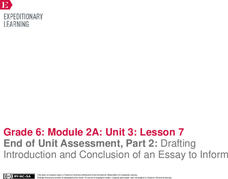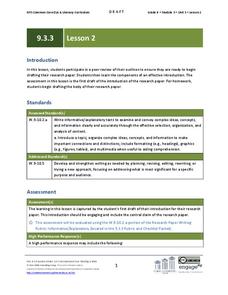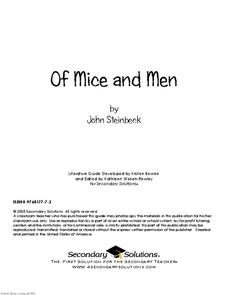EngageNY
End of Unit 2 Assessment: Final Literary Analysis
Get ready to review and revise! Scholars peer edit each other's literary analysis essay drafts. Next, using peer and teacher feedback, pupils compose their final drafts.
Core Knowledge Foundation
Unit 5: Geology
Over four weeks, fourth graders participate in a geology-themed unit. Scholars listen to informational texts, discuss readings, and complete word work and grammar lessons. Writing practice includes drafting an informational pamphlet, a...
EngageNY
End of Unit 2 Assessment, Part One: First Draft of Analysis Essay
How do writers use evidence from literary texts to support analysis and reflection? With instructional activity 17 of 20 from the Grade 8 ELA Module 1, Unit 2 series, learners gather resources to prepare for an end-of-unit assessment....
National Endowment for the Humanities
The Glass Menagerie: Impact of Expressionism
Young scholars are challenged to write a realistic analysis of Tennessee Williams' nonrealistic memory play, The Glass Menagerie. Writers use the evidence gathered on their worksheets to craft an effective thesis and concluding statement...
EngageNY
Grade 9 ELA Module 1: Unit 3, Lesson 20
The final session in this 20-lesson plan unit asks individuals to use their Quick Writes, discussion notes, worksheets, and annotated text to craft and support a claim about how Shakespeare develops either Romeo or Juliet as tragic heroes.
EngageNY
End of Unit Assessment, Part 2: Drafting Introduction and Conclusion of an Essay to Inform
A powerful introduction and conclusion can really pack a punch. Using the resource, scholars first read and discuss a model essay. Then, as part of the end of unit assessment, they draft the introductory and concluding paragraphs of...
EngageNY
Grade 9 ELA Module 2, Unit 3, Lesson 5
After rereading the full text of Walter Mosley's essay "True Crime," groups complete an evidence collection tool worksheet, and then class members independently draft a multi-paragraph, evidence-based response that identifies how Mosley...
EngageNY
Grade 9 ELA Module 2, Unit 3, Lesson 10
Did Bernie Madoff fit the profile of a Ponzi schemer because, as Diana Henrique contends in an excerpt from her The Wizard of Lies: Bernie Madoff and the Death, he “did not fit the profile of a Ponzi schemer”? Huh? Groups begin their...
EngageNY
Further Research: Hunter-Gatherer Food Chain
It's time to gather nuts, berries, and lots of information. Scholars continue on their quest to determine the consequences of each of Michael Pollan's food chains from The Omnivore's Dilemma. Using research questions developed in a...
EngageNY
Analyzing the Features of an Informative Consumer Guide
Analyze, strategize, synthesize! Scholars analyze informative consumer guides to determine what features to include in their own guides. Next, pupils select charts and images to use in their guides.
EngageNY
Grade 9 ELA Module 3, Unit 3, Lesson 2
After a peer review of their outlines, class members examine a model of an effective, engaging introduction and then craft the first draft of the introduction to their research paper.
EngageNY
Grade 9 ELA Module 3, Unit 3, Lesson 3
Plagiarism is the theft of intellectual property. To avoid this crime, class members learn how to create a works cited page and how to craft in-text citations. After examining a high-performance model paragraph and an example of a works...
Museum of Tolerance
And Justice for All? Slavery Not Just in the Past
Slavery in India, Sudan, and Mauritania? What about in the United States? Groups research modern slavery in these four countries, collecting factual evidence (What), determine their feelings about this evidence (So what), and consider...
Museum of Tolerance
The Role of Citizens in a Participatory Democracy
Groups research participatory democracies and compare the role and rights of citizens in ancient history with those in recent U.S. history. Guided by a series of questions, individuals compose a persuasive essay in which they discuss the...
Curated OER
House and Holmes: A Guide to Deductive and Inductive Reasoning
Test your pupils' reasoning skills with several activities and a quick mystery to solve. Learners watch and analyze a few video clips that demonstrate reasoning in action, practice deduction with an interactive and collaborative...
Curated OER
Creative God or Goddess
Who causes sinkholes? Or acid rain? High schoolers try their hand at myth-making as individuals create a god or goddess responsible for the modern-day phenomenon. They introduce their deity in an essay that reveals the name, parentage,...
Museum of Tolerance
Music Evokes Memories and Emotions
Dim the lights, take a deep breath, and press play to explore the emotions and memories that music elicits. Class members begin using relaxation techniques designed to create a positive listening experience. As music plays, learners...
Curated OER
The Use of Language in "I Know Why the Caged Bird Sings"
Readers of I Know Why the Caged Bird Sings are asked to craft an essay in which they compare how Maya Angelou uses figurative language to depict herself and Mrs. Flowers.
Secondary Solutions
Of Mice and Men: A Literature Guide
Whether you are planning on using Of Mice and Men for whole-class reading or as a selection for literature circles; whether you are new to John Steinbeck's novel, or it has long been a part of your curriculum, you will find a wealth of...
Literacy Design Collaborative
Elie Wiesel's Acceptance Speech Analysis
Elie Wiesel's Nobel Prize Acceptance speech provides young historians with an opportunity to demonstrate their ability to use evidence from the speech. They work together to analyze how Wiesel uses rhetorical devices and syntax to...
University of California
The Civil War: Strategies and Battles
Was it the War against Northern Aggression or the War to Unify the Union? Scholars investigate the key battles and strategies of the American Civil War to determine just why the North was victorious in the end.
Syracuse City School District
Summary of Fiction and Non-Fiction Text
Somebody Wanted But So Then (SWBST)? Yes! Here's a great strategy for teaching young readers how to summarize narrative text. In addition, the packet includes exercises that show kids how to summarize nonfiction text using the classic...
Santa Ana Unified School District
Early American Poets
The poems of Walt Whitman and Emily Dickinson are the focus of a unit that asks readers to consider how an artist's life and changes in society influences his or her work. After careful study of Whitman's and Dickinson's perspectives on...
Austin Independent School District
Social Studies Strategies: Concept of a Definition Map
Model for your class members how to use a definition map to make connections between new words and prior knowledge. Although the strategy is designed for social studies classes, the approach can be use at any grade level and in any...
Other popular searches
- Expository Writing Prompts
- Expository Writing Template
- Expository Writing Lessons
- Expository Writing Exercises
- How to Expository Writing
- Voice in Expository Writing
- Expository Writing Rubrics
- Expository Writing Exemplars
- Expository Writing Peer Edit
- Writing Expository Essays
- Writing Expository
- Writing Expository Paragraph

























